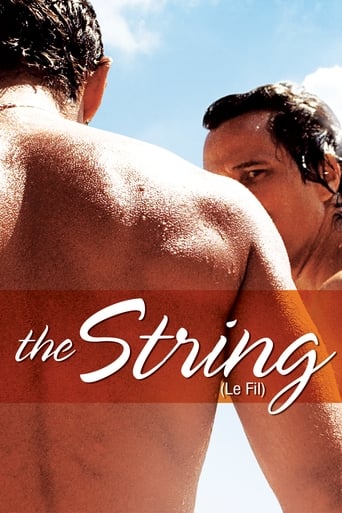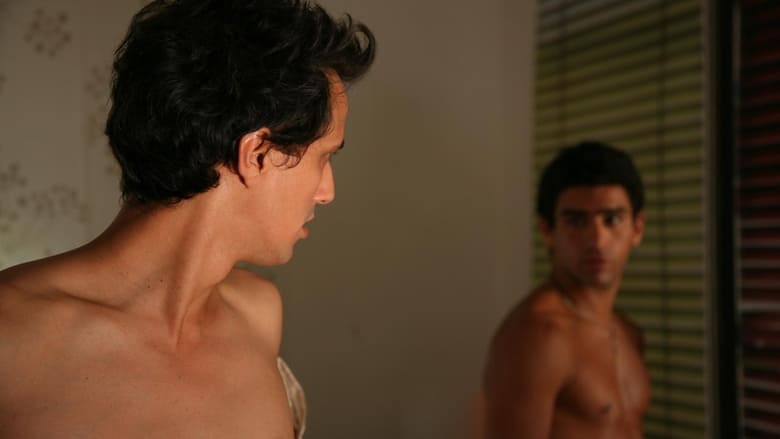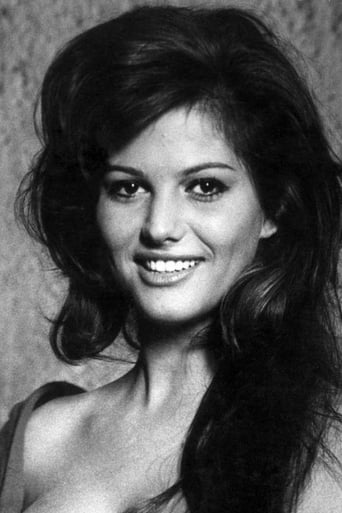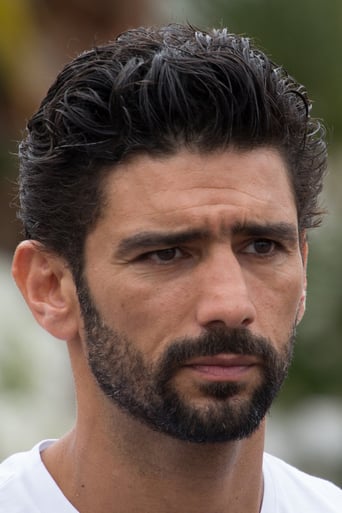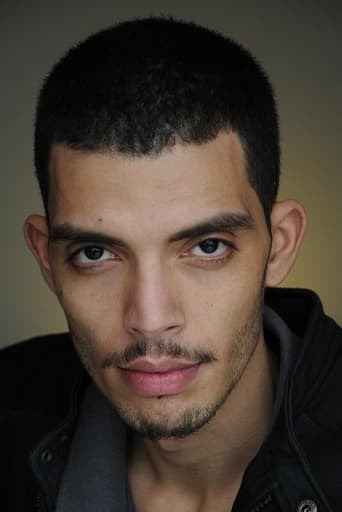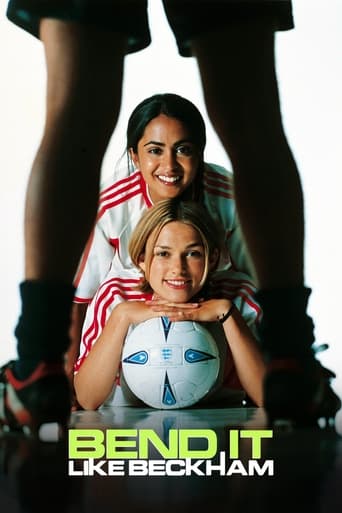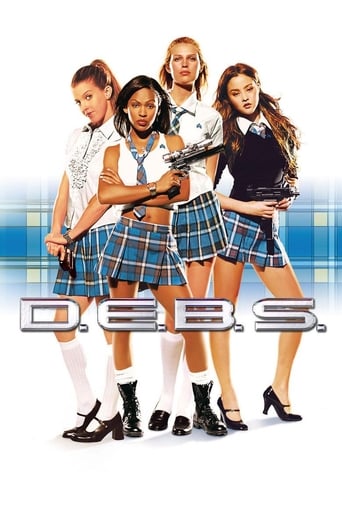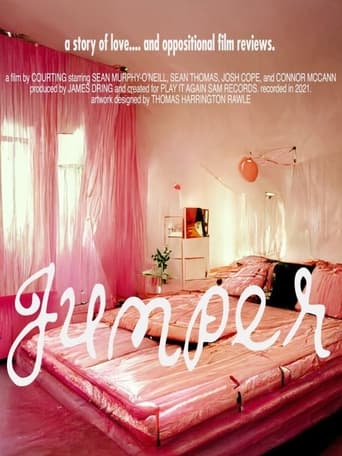The String (2009)
Malik has a lot on his plate when he returns home to Tunisia after living in France. He's processing his father's death, he can't come out to his mother, and his childhood anxieties have resurfaced. But all of Malik's problems seem to fade away when he falls for Bilal, the dreamy houseboy at his mother's bourgeois estate.
Watch Trailer
Cast


Similar titles
Reviews
Self-important, over-dramatic, uninspired.
Bad Acting and worse Bad Screenplay
This story has more twists and turns than a second-rate soap opera.
Great movie. Not sure what people expected but I found it highly entertaining.
The film was all right, but the soundtrack was so horrible that it ruined so many scenes. The whole string thing didn't make much sense, they could have skipped it, although it did show the progress that the character made throughout the movie. I thought that Malik's father's appearances were very odd at times, for example when he was talking to Malik's mother about his (Malik's) homosexuality. The ending was also very odd, since Malik and Bilal were together and Siryne and Leila were together, it didn't make much sense that Malik and Siryne got married. It would have made much more sense had they just been parents together, but nothing more. It wasn't like they were hiding their homosexuality, so the marriage didn't have any obvious reason.The acting was terrific, though. I loved Malik's mother, she was a wonderful character and Claudia Cardinale portrayed her wonderfully. I loved Malik and Bilal's relationship but, again, I don't understand why Malik had to get married. I also loved Siryne and Leila's relationship, it wasn't the most typical relationship, and I liked that. Siryne's father, even though he merely appeared in one small scene, was wonderful and very well portrayed.
For this film, directed and written by Mehdi Ben Attia does that very thing. It doesn't preach a message, it doesn't force people to sacrifice their lives or dignities. It just tells a story of two men who fall in love and live happily ever after. Why not? Why can't there be such films? My hat is off to those responsible for making this happen. Writers, director and a wonderful cast.And how wonderful to see Claudia Cardinale again. Still with those beautiful eyes and looking smashing as the mother of one of the boys who fall in love. She also gets to go through all the moments that most mothers go through in finding out their son is gay. Cardinale is terrific. As her gay son, Atonin Stahly, too, is wonderful. He didn't miss a beat in this. From the frustrated son coming home to dealing with a possessive mother to falling in love. As his love interest, Salim Kechiouche seems perfectly fitted for the role. A beautiful, sensitive young man bringing much passion into his role. At first you feel something is going to happen. Something will go wrong. This is too beautiful to last. As in most gay love stories, it usually does. But in this is doesn't. The ending is so beautiful and touching, you want to stand up and cheer. Thanks for a lovely romantic love story between two men.
This is actually a very good film. the plot-line is intelligent and interesting; it is well acted, directed, and filmed. Its major flaw is that, like most gay oriented films, the major characters are all beautiful. This film deals with real social problems that should be able to move gay audiences particularly, but also a straight public. Why, then, must the action be transported to the realm of the beautiful people, whom the majority of the audience can envy and even empathize with to some extent, but somehow not quite identify with? Having the action take place in beautiful surroundings among beautiful people is, of course, not limited to films that treat gay issues. But it seems to be endemic in films with gay social content, and in that sense, it is particularly harmful. What gay audiences need to see, and what straight people interested in gay issues also need to see, are gay social issues treated as taking place among average looking people in average looking surroundings. These are everyday issues touching the lives of the large majority of gay people. They are not abstractions; they are painful realities. This is no place for physical idealization. The issues are too serious for this type of useless, distracting decoration.
Le Fil(aka The String) promises much but delivers little. This directorial debut by Mehdi Ben Attia is confused by what it wants to be. Starting as a commentary on quasi-French colonialism vis a vis Tunisian servitude, Le Fil then dabbles unsuccessfully in a range of conflicting cinematic genres – from melodrama to thriller to comedy. It seems to favour melodrama but masters none. Ultimately, the film wants to satisfy every genre but ends up a dissatisfying mess. The editing also feels rushed as if the film has to be under 90 minutes. There is not much of a plot to drive the narrative. What starts of as a restrained gay version of Mommie Dearest soon becomes something altogether different.Claudia Cardinale is maniacal enough to maintain her bitchiness as the archetypal overbearing mother, whose closeted French-Arab architect son, Hakim returns home to live with her in Tunusia. Soon enough conflicts arise between both, and the Oedipal attachment is soon erupted by the son's longing for the Tunusian handyman, Bilal. The son is torn between his mother's approval and his desire to live as a gay man in Tunisia. The fact that he could easily have moved back to France with his handyman is not even mentioned. Instead we are treated to a dubious moral fable about the importance of family – the ties that bind can imprison us, but they also liberate us at a price: the façade of social conformity.I also found the conceit of the string, real and imagined, was rather crude. As a symbol of the umbilical cord it might have a Freudian significance, but it felt clumsily realised and out of touch with the film's penchant for realism. The film feels like a reflection of many gay men's reality by saying that gay men must compromise their lives to live in a heterosexist world. In spite of the happy ending that reaffirms the conservative values of family, Le Fil climaxes as a depressing tale for gay men who want to be free of the strictures of family life.

